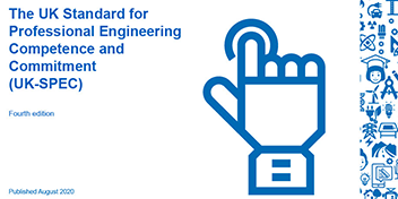Recognised programmes have been approved or accredited by one or more of the Licensed Professional Engineering Institutions (PEIs) as delivering some or all of the underpinning knowledge and understanding and/or competence for professional registration.
Degrees may be accredited against the Accreditation of Higher Education (AHEP) Standard as delivering knowledge and understanding to support Chartered (CEng) or Incorporated (IEng) registration.
Other qualifications and apprenticeships may be approved of accredited against the Approval of Qualification and Apprenticeships (AAQA) Standard.
You can use the Engineering Council's course search database to check whether specific programmes (degrees, apprenticeships or qualifications) have been recognised. It is important to check the intake year column as what matters is the recognition status for the year you start a programme.
If recognition status is not renewed during your studies, you and any other students already on that course would still graduate with a recognised degree, apprenticeships or qualification as long as it was approved or accredited when you began studying. Students starting a programme part-way through should check the accreditation status as if entering the first year.
It is also important to consider what recognition applies. For instance:
- If a degree ‘meets the academic requirements for CEng but with further learning required’ then you will need to undertake additional Masters level learning in order to fully meet the academic requirements for CEng registration
- If a degree is accredited as ‘further learning for CEng’ it meets the further learning requirements for holders of an accredited Bachelors Honours degree
Awarding organisations and providers decide whether they wish to apply for approval or accreditation. Some choose not to, and individuals who complete programmes that aren’t recognised may also work towards registration via an individual assessment by their Licensed PEI. Further information on individual route applications is available from the institutions themselves.
Once you begin your programme, join a relevant Licensed PEI!
Whilst studying, you might be offered either free or reduced rate membership. Becoming a member of a Licensed PEI looks great on your CV and can provide you with connections and resources to help you to get the most from your studies.
You might find that your Licensed PEI offers ways to actively engage as a student, such as becoming its student rep. Once you join, your Licensed PEI will let you know how best to become involved.
Many programmes involve an optional industrial placement or some other element of work-based learning which provide a good opportunity to develop your engineering competence. You should begin recording the competence developed in the workplace that you will need as evidence when you apply for professional registration.
Placements often result in offers of employment after graduation, but if yours doesn’t lead directly to a permanent job it is still a strong addition to your CV. The experience and knowledge you develop through a placement or work-based programme will help prepare you to complete a successful final year of study and could inform any project work.
We advise you stay in contact with your Licensed PEI.
Make sure that you advise your Licensed PEI of your up-to-date details as your membership will be of enormous value in the early years of your career.
Most of the resources available to you from your Licensed PEI membership to enhance your skills and knowledge.

Information for students, graduates and apprentices ›
Starting your exciting career in engineering? Professional registration will be an important future step on your career ladder.

Information for higher education providers ›
The Engineering Council supports the development of engineering degrees that will equip students to become professional engineers.

Search for your course ›
Search our database if your course opens up the start of your exciting journey to professional registration.

UK Standard for Professional Engineering Competence and Commitment (UK-SPEC) ›
UK-SPEC describes the standards for professional registration as a CEng, IEng or EngTech.

The professional titles ›
Take a look at the professional titles you can obtain to achieve the benefits of becoming professionally registered.





